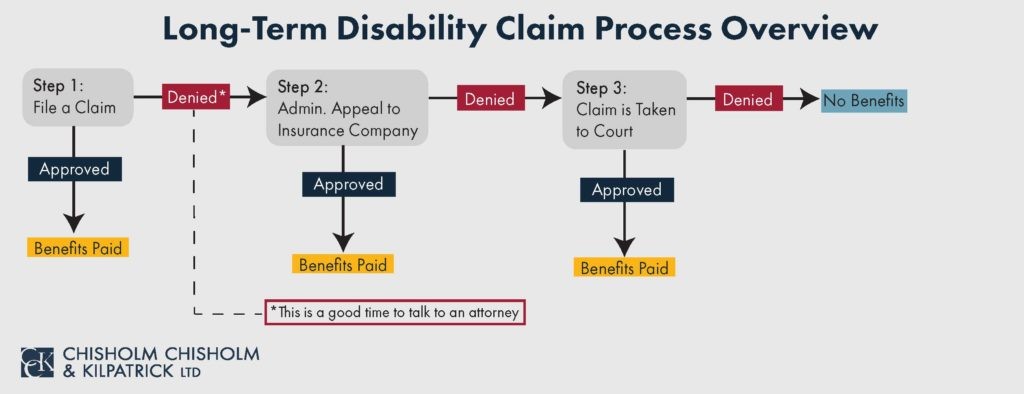Getting Long-Term Disability (LTD) Benefits for Epilepsy

Epilepsy is a common condition that affects roughly 1 in 26 people. This condition can be debilitating and difficult to control and can cause many limitations that affect a person’s ability to work. Unfortunately, the process for applying for long-term disability (LTD) benefits is frustrating and difficult, and wrongful denials are all too common.
At Chisholm Chisholm & Kilpatrick LTD, our team of attorneys and professionals can help you fight for the benefits you deserve while you continue to focus on your health and manage this condition. Insurance companies are powerful entities that have access to many resources and, unfortunately, are often driven by their own financial gains. We help our clients access their ERISA and non-ERISA long-term disability benefits by fighting the insurance company and often get our clients the benefits they are entitled to.
Contact us today at 401-331-6300 for a FREE consultation and see if we can fight for you.
Understanding Epilepsy
Epilepsy is a neurological disorder in which brain activity becomes abnormal and leads to a seizure or a disturbance in the electrical activity of the brain. Epilepsy is typically not diagnosed until an individual has at least two unprovoked seizures.

Signs that you may have experienced a seizure include temporary confusion, staring spells, uncontrollable jerking movement of the extremities, loss of consciousness, and increased fear and anxiety, however, there are different types of seizures and the symptoms can vary. One type of seizure is focal seizures, which affects one area of the brain. Focal seizures fall into two categories: focal seizures without loss of consciousness and focal seizures with impaired awareness.
Focal seizures without loss of consciousness may result in altered emotions and sense, involuntary jerking of a body part, most commonly the arms or legs, and spontaneous sensory symptoms like dizziness and tingling. The individual will not lose consciousness when having this type of seizure. Focal seizures with impaired awareness involve either a change in, or loss of, consciousness or awareness. Individuals experiencing this type of seizure often have starring spells and perform repetitive movements like chewing, hand rubbing, or pacing in circles. The individual also may not respond normally to their surrounding environment.
Seizures that involve all areas of the brain are called generalized seizures and are typically broken up into six types: absence seizures, tonic seizures, atonic seizures, clonic seizures, myoclonic seizures, and tonic-clonic seizures.
- Absence seizures occur most commonly in children and are typically identified by staring spells and subtle body movements like repetitive eye blinking or lip smacking.
- Tonic seizures usually cause the muscles in your back, arms, and legs to stiffen, sometimes resulting in people falling to the ground.
- Atonic seizures are commonly known as drop seizures; this type of seizure causes loss of muscle control and often results in the individual falling down.
- Clonic seizures involve the repetitive and jerking movement of muscles, usually in the neck, face, and arms.
- Similarly, myoclonic seizures usually occur suddenly and present as brief jerks or twitches in the arms and legs.
- Lastly, tonic-clonic seizures, previously known as grand mal seizures, typically cause an abrupt loss of consciousness, body stiffening and shaking, and occasionally loss of bladder control and biting of the tongue.
In order to diagnose you with epilepsy, your doctor will likely review your symptoms and medical history, as well as run blood tests and perform a neurological exam to test your behavior, motor ability, and mental function. Your doctor will likely suggest you undergo an electroencephalogram or EEG. This test involves attaching electrodes to your scalp to monitor and record the electrical activity in your brain.
Treatment
Although epilepsy is a serious condition, it can usually be managed with anti-epileptic medications. In some cases, you may be able to discontinue your medications after two or more years without a seizure. Other times, you may require the medication to decrease the frequency and intensity of the seizures you experience.
Your doctors may also suggest different types of therapies and alternative treatment options such as following a ketogenic diet, undergoing deep brain stimulation with the use of electrodes implanted into your brain, or implanting a vagus nerve stimulator, which is a device similar to a pacemaker that sends electrical energy through the vagus nerve to the brain.
In severe cases where medication and other therapies are not enough to control the seizure activity, epilepsy surgery is an option. Since this type of treatment involves a surgeon removing the area of your brain that causes the seizures, it is usually only performed when the seizures originate in a small, well-defined area of the brain or when the area of the brain that is being removed does not interfere with vital functions such as speech, motor function, vision, and hearing.
How the Long-Term Disability Attorneys at CCK Can Help With Epilepsy Long-Term Disability Denials
Epilepsy is a serious condition that unfortunately results in limitations that can impact your ability to work. Often, the seizure activity is unpredictable and can lead to you being an unreliable employee. Additionally, depending on the type of job you have, you may be exposed to stimuli like flashing lights, loud noises, or increased stress, which can trigger seizure activity. Further, depending on your job, the risk of unpredictable seizure activity alone could prevent you from performing your job duties.
For example, if you are a truck driver, you are likely unable to drive due to the risk of seizure activity on the road. Insurance companies often do not take into consideration the aggravating factors of a condition and instead look simply at the symptoms themselves. If you have been wrongly denied by an insurance company despite having debilitating and limiting symptoms of epilepsy, CCK can help level the playing field for you against the insurance company and file an administrative appeal on your behalf.

There are a few key pieces of evidence that we rely on when handling a long-term disability appeal. First, we review the insurance companies’ denial letter, policy, and claim file and determine if any errors were made by the company during the handling of your claim. We use our knowledge of ERISA, the U.S. Department of Labor Regulations, and insurance policies to identify these errors.
Next, we gather your medical records and determine if additional testing, reports from your treating doctors, or expert opinions are necessary in order to fully illustrate the restrictions and limitations you experience on a day-to-day basis that keep you from working.
Many times, your doctors want to help but are often too busy managing their own medical practices to put detailed notes in your medical records. It is important that you discuss your disability with your doctor and ask them to document important changes in your condition such as increased pain, fatigue, medication changes, side effects, imaging results, etc. It is also important that you have open communication with your doctors and ensure they understand how your condition impacts your ability to work, as well as perform other activities of daily living.
In most cases, we gather additional reports from your doctors or expert opinions if the record is not clear. Preparing a strong and complete evidence record is extremely important in ERISA-governed long-term disability appeals because it is often the claimant’s last opportunity to submit evidence into the record before heading to court. We make sure that we build a strong argument at the appeal stage so that we are in a good position if the appeal is denied and we need to file a lawsuit against the insurance company.
Chisholm Chisholm & Kilpatrick LTD May Be Able to Help
Let us ease your burden. Contact us now at 401-331-6300 for a FREE consultation and see if we can assist.

Share this Post